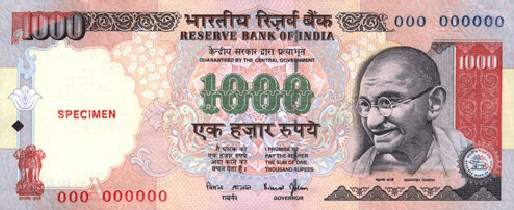On 8th November 2016, at around 8pm, Narendra Modi, the Prime Minister of India, in a shock announcement, declared that 86% of currency notes in circulation—notes denominated ₹500 and ₹1,000—are no longer legal tender from midnight. Instead new notes with denominations ₹500 and ₹2,000 will be issued. Holders of old notes can deposit them at their banks or exchange them from any bank.
A thousand rupee note, which is no longer a legal tender. Source: RBI
This has led to the “wisdom” that using the old notes is illegal or something. This was partly because of Modi’s own words:
To break the grip of corruption and black money, we have decided that the five hundred rupee and thousand rupee currency notes presently in use will no longer be legal tender from midnight tonight, that is 8th November 2016. This means that these notes will not be acceptable for transactions from midnight onwards.
What is a legal tender? Usually currency notes (and coins) are considered legal tender. It is something which can be used to:
- extinguish existing debt,
- settle fines decided by the courts,
- pay taxes.
Credit card and cheque payments or electronic funds transfer are not usually considered legal tender. One can of course settle existing debts such as to a credit card company using funds in your bank account (i.e., not using legal tender) but this is perhaps because of the agreement you may have signed with your credit card company or in good faith: the creditor can insist you pay in legal tender but may not have a chance in courts if you settle your debt using funds in your bank account. Same with corporate bonds or loans from banks and government’s debt.
It’s also possible to pay in foreign currency to settle your debt as long as the creditor accepts.
It’s also important to make a distinction whether it is (pre)existing debt or not. So for example, payment for a T-shirt may not fall in the above list, as the funds you owe the shopkeeper comes into existence only after you express an interest to own the T-shirt. Hence the shopkeeper may reject your payment method. I believe, some shops in Sweden do not accept currency notes. But a Swedish creditor such as a credit card company or a bank must accept the currency notes for a repayment of a debt or a loan if the debtor insists.
And of course, people buy T-shirts with credit cards. So we come to the important point. As long a seller of goods or services in India accepts the old ₹500 or ₹1,000 notes, it’s not illegal at all for the same reason that buying something with a credit card is not illegal. The seller might accept it in the knowledge that he has time till Dec 30 to get the notes exchanged at bank.
But there are more complications. The message of the Indian government has been that anyone who deposits large amounts of cash notes can be investigated. So this affects the acceptance of old notes. Anyway, this point is separate from the confusion people have that it is illegal to use old notes. No, it is as legal to use old notes to transact like like it’s not illegal to buy a T-shirt with your credit card.
But in reality very few economic units are accepting old notes. I believe it’s party because of fear of being with too many currency notes and also because of the incorrect notion that it’s illegal to do so.
Update: After I wrote the first draft, I found this from the Swedish central bank Riksbank’s website:
Other questions about banknotes and coins
Can shops refuse to accept cash?
The main rule is that cash is legal tender and therefore shall be accepted as payment. This rule can, however, be waived by shops, restaurants, etc. In principle, therefore, a shop can refuse cash entirely, refuse to accept coins or certain denominations (e.g. 1000-krona banknotes) or even refuse to accept banknotes and coins that are soon due to go out of circulation, etc. From a consumer perspective, it is better for me to get this information in good time (for example in the form of a sign on the shop door) so that I can choose if I want to shop there or go somewhere else.
The question of whether a shop may refuse older banknotes and coins but accept new ones has, as far as we know, not been tested in court and it is therefore not possible to answer it with any degree of certainty. The Riksbank’s position is that shops that accept cash should accept both older and new banknotes and coins as long as they are legal tender. Shops should not refuse to accept the older banknotes and coins until after 30 June 2017, as this is when they will cease to be a valid means of payment.